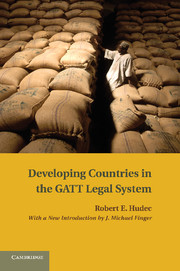Book contents
- Frontmatter
- Contents
- Foreword by Hugh Corbet
- Acknowledgments
- DEVELOPING COUNTRIES IN THE GATT LEGAL SYSTEM
- Introduction to the New Edition
- PART I A HISTORY OF THE LEGAL RELATIONSHIP
- PART II A LEGAL CRITIQUE OF THE GATT'S CURRENT POLICY
- 7 Basic Elements of the Legal Criticism
- 8 Separating Legal and Economic Issues
- 9 Impact of GATT Legal Policy on Internal Decision-making
- 10 Impact on Decisions in Other Governments: Non-reciprocity
- 11 Impact on Decisions in Other Governments: Preferences
- 12 First Steps Towards a Better Legal Policy
- List of References
- Index
7 - Basic Elements of the Legal Criticism
Published online by Cambridge University Press: 03 May 2011
- Frontmatter
- Contents
- Foreword by Hugh Corbet
- Acknowledgments
- DEVELOPING COUNTRIES IN THE GATT LEGAL SYSTEM
- Introduction to the New Edition
- PART I A HISTORY OF THE LEGAL RELATIONSHIP
- PART II A LEGAL CRITIQUE OF THE GATT'S CURRENT POLICY
- 7 Basic Elements of the Legal Criticism
- 8 Separating Legal and Economic Issues
- 9 Impact of GATT Legal Policy on Internal Decision-making
- 10 Impact on Decisions in Other Governments: Non-reciprocity
- 11 Impact on Decisions in Other Governments: Preferences
- 12 First Steps Towards a Better Legal Policy
- List of References
- Index
Summary
THE LEGAL debate does not involve any open disagreement about ultimate objectives. Both critics and supporters of the current policy speak of the same ultimate goal – the maximum possible improvement in the economic welfare of developing countries. Critics of the current policy never say that it gives developing countries too many economic benefits. On the contrary, they argue that the present policy does not give developing countries as much economic benefit as would some alternative policy. The central issue is not whether, but how to provide greater economic benefits.
AGREEMENT ON A COMMON GOAL
One line of argument that sometimes puts this common goal into question is the “graduation” doctrine of the United States – the concept which argues that advanced developing countries should grant reciprocity as their economic development improves. Taken at face value, the mercantilist rationale for this doctrine seems to be saying that advanced developing countries who do not grant reciprocity are keeping for themselves economic benefits that properly belong to developed countries and that these benefits should be paid over. But, while domestic advocates of the graduation concept sometimes sound like this, the concept is simply never presented this way in government-to-government discourse in the GATT. No developed country would ever ask a developing country to decrease its own level of economic welfare and especially not for the purpose of improving developed-country welfare.
- Type
- Chapter
- Information
- Developing Countries in the GATT Legal System , pp. 118 - 122Publisher: Cambridge University PressPrint publication year: 2010



